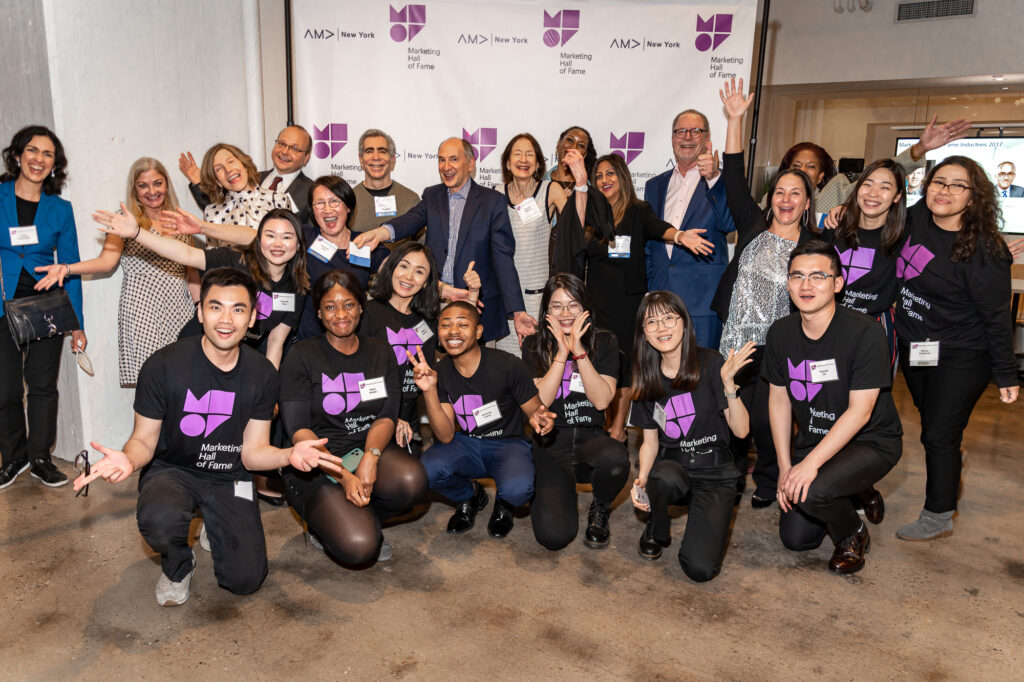Joanna Seddon, Managing Partner, Presciant
Why the Marketing Hall of Fame is different.
Induction into the Marketing Hall of Fame is a unique honor. The Marketing Hall of Fame is different from other awards in five ways that make it an honor its recipients can be especially proud of.
- It is holistic, the only award that covers the whole of the marketing profession—from CMOs, to company founders, to agency leaders, to research and data specialists, to academics and writers.
- It is democratic. Inductees are elected not selected. Nominations are open to anyone, voted on by the Marketing Hall of Fame Academy’s almost 400 members and then by the CEOs of the major industry associations. We have no influence on the outcome. We wait in terror each year to see who comes top.
- It is future oriented. Our purpose is to celebrate outstanding marketing innovators, people who have their hands deep in marketing today and are shaping its future.
- It is modern, educational, and inclusive. It’s open to anyone. We keep ticket prices low. No white tablecloths and rubber chicken. No stuffy speeches. Instead, we ask each inductee to share their views on marketing’s future from the pov of their careers.
- It evolves as marketing evolves. The original hall of fame focused on companies and was more traditional – Steve Jobs was one of the early inductees, accepting the award on behalf of Apple. We reinvented it a number of years ago. And, during COVID, we reinvented it again adding diversity and sustainability to our list of election criteria and expanding the Academy and Panel of Judges to include broader audiences. We look forward to the next stage of evolution and to innovators in marketing AI joining our inductees.
Why it’s more important than ever.
In these uncertain times, marketing is in disarray. The impact of marketing investment is not well demonstrated. Marketing’s role as the driver of the demand chain—sales and profits—is not accepted. CMO’s are not respected, positions are being abolished, new titles are proliferating. And marketing organizations, roles and responsibilities are all over the place.
It is more critical than ever to recognize the achievements of four brilliant marketing innovators who are striving to change all this, the 2023 Marketing Hall of Fame inductees: Amy Fuller, Dan Ariely, Chris Capossela, and Raja Rajamannar.
We can learn a lot from their experience and wisdom. Amy, for the past 5 years CMO of Accenture, has put marketing and branding on the growth agenda at major international companies, including Accenture, Kraft, AT&T, Verizon, Siemens, IBM, Deloitte and Mastercard. Dan, Professor of Behavioral Economics at Duke University is famous for his pioneering work in Behavioral Economics and has sold 4 million copies of his books. Chris, EVP and CMO for Microsoft, has been running worldwide marketing for almost 9 years and has quietly transformed the Microsoft brand. Raja, Mastercard’s Chief Marketing and Communications Officer, has introduced innovative multi-sensory experiences, and turned Mastercard into one of the world’s fastest growing brands.
What they said.
Each gave their perspectives on the future of marketing and their advice to future marketers. The presentations were inspiring, insightful and motivating. Here are some of the key themes that emerged.
- Be bold.
Think beyond, break out, don’t be afraid.Amy’s motto, which her son has tattooed on his arm, is “ski or be skied.” Grab problems as early as you possibly can, and ski them.Dan’s principle is unconstrained thinking. Don’t take constraints into account. Go full into it, as if there’s no control. The constraints will come later. Start by taking an idea to the extreme, and then dial it back.
Monica Brown, Director of Executive Communications who introduced Chris, spoke of how he “encourages us to think boldly, challenge the status quo, and deliver experiences that empower every person to achieve more.”
Linda Kirkpatrick, President of Mastercard North America, introduced Raja by saying “I’ve never met anyone with more passion for creating the new and different.”
- Make friends with the CFO.
Get out of the bubble of marketing and go deeper in the organization. Involve the whole company, beginning with the CFO.As Amy put it, “Who should your best friend be? The CFO.” Why? Because it’s the CFO who can tell you what the drivers of growth and financial success are. Marketing must link to money. If you’re not tied into how your company goes to market and makes money, you’re not doing your job.Chris reinforced this point, “I’ve suffered a long time alongside our CFO. The CFO is the most important best friend to the marketer.”
- Start with business strategy.
Look at brand and marketing as the expression of business strategy.“It’s relatively easy to create a marketing plan,” Amy said. “All you need is the business plan, and the business plan will write the marketing strategy.”Chris modestly attributes his success to the company’s changing business strategy, “I’ve been blessed that the company has been forced to change, so that marketing has had to change with it.” He says the fact that Satya Nadella was completely reinventing the company made his job much easier. “I think a lot of CMO’s struggle with their jobs because their peers don’t see any need to change anything, but when the boss of the whole company said ‘we’ve got to reinvent the entire firm, shift ahead or else,’ it gave marketing the opportunity to ride that wave, which is really helpful.”
- Think ahead.
Create the next generation marketing model. Marketing needs to be completely reinvented and reimagined.Chris says that Microsoft is maniacally focused on “business model bravery.” This means designing the business model 10 years before you need it. In the context of AI, how do you need to reinvent the business model and, with it, the function of marketing? You may need to redesign it every 3 weeks. That’s the world we are living in now.Raja is equally emphatic. His view is “every single thing we do today in marketing is already obsolete. We need to redo it in a completely different way.” The rate of change is mind-blowing. Part of this is the new technologies which are coming, AI, augmented reality, virtual reality, autonomous cars, blockchain. There are also tectonic changes happening in the cultural landscape. These have a direct impact on marketing which has to be plugged into culture and in a way that stands out in consumers’ minds. His book, Quantum Marketing, is about the fact that marketing is at an inflexion point. It’s time to move into a “fifth paradigm.”
- Make the invisible visible.
Go back to the basics of human behavior as the construct for marketing. Don’t stick to the superficial.Dan described the hard challenges faced by brands whose products and services are invisible. Financial products are invisible, versus things such as beer, iPhones, cars, which are visible. There is a very unfair competition between the two of them because of basic human behavior. People are attracted to buy things they can see and touch, even though products and services such as insurance and savings which they can’t see may bring them greater benefits. You have to change this and find a way of making the invisible visible.This is what Raja has done at Mastercard. As a payments company, Mastercard historically had pushed offers and rewards: miles back, safe and secure, extra cash back, instant transactions, clear statements, etc. Raja and his team realized that consumers don’t care about most of this. What they want is great experiences in their lives. Raja has implemented a multi-sensory strategy and made Mastercard a brand that you can see, taste, touch, smell and hear—touch cards for blind people, Mastercard restaurants, “Priceless” fragrances, and a sonic strategy with melodies and music. In the end, it’s all about creativity. As Raja puts it, “our brand is much bigger than our budget. It is our creativity and our innovation that is outsized.”
Why there’s never been a better time to be a marketer.
Don’t be put off by marketing’s current disarray. Uncertainty creates a tremendous opportunity for marketers to create more value.
As Amy put it, this “mess of a moment,” the lack of a playbook for almost everything, is the ideal situation for marketers, who have the unique curiosity and creativity to exploit it. Marketing is a good field to be in, because it’s a field of continuous growth, and continuous re-education. It’s a place for those who like to see change, experience change, and learn new things. In marketing you must, it’s not an option.
As Raja says, everything is speeded up, constraints are removed. “You couldn’t get into the field of marketing at a better time than this, because this is one time in its entire history where you can operate at the speed of thought, without the traditional and historical constraints that we have had. It’s absolutely inspiring to be in marketing now.”

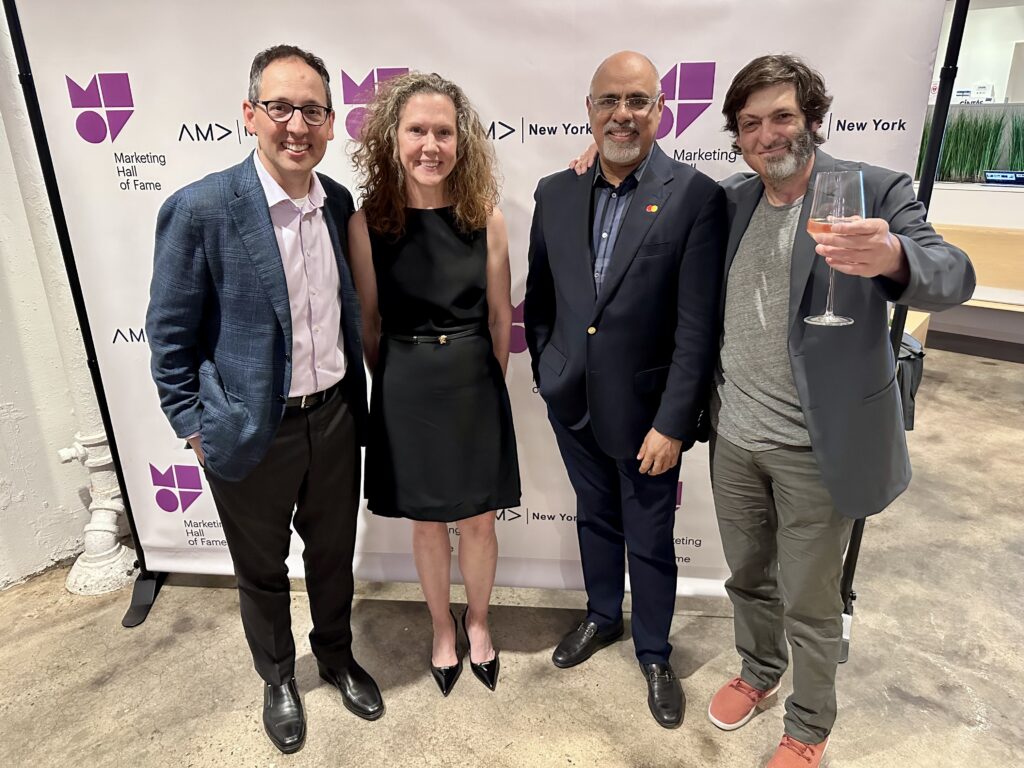

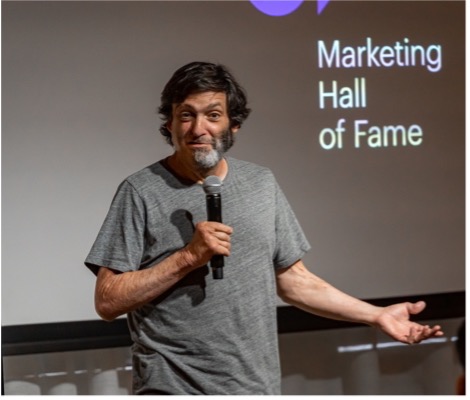 Dan’s principle is unconstrained thinking. Don’t take constraints into account. Go full into it, as if there’s no control. The constraints will come later. Start by taking an idea to the extreme, and then dial it back.
Dan’s principle is unconstrained thinking. Don’t take constraints into account. Go full into it, as if there’s no control. The constraints will come later. Start by taking an idea to the extreme, and then dial it back.
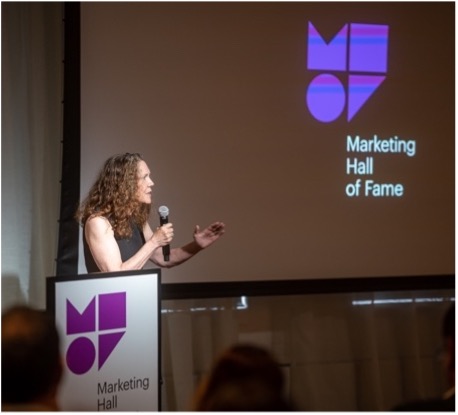 As Amy put it, “Who should your best friend be? The CFO.” Why? Because it’s the CFO who can tell you what the drivers of growth and financial success are. Marketing must link to money. If you’re not tied into how your company goes to market and makes money, you’re not doing your job.Chris reinforced this point, “I’ve suffered a long time alongside our CFO. The CFO is the most important best friend to the marketer.”
As Amy put it, “Who should your best friend be? The CFO.” Why? Because it’s the CFO who can tell you what the drivers of growth and financial success are. Marketing must link to money. If you’re not tied into how your company goes to market and makes money, you’re not doing your job.Chris reinforced this point, “I’ve suffered a long time alongside our CFO. The CFO is the most important best friend to the marketer.”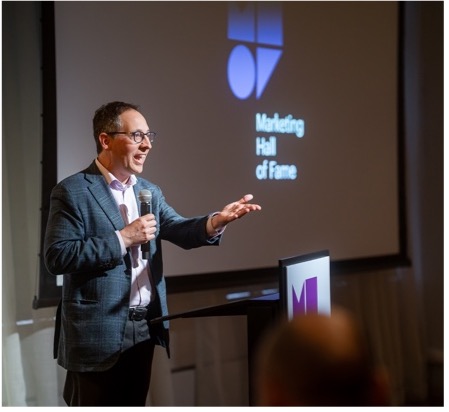 Chris modestly attributes his success to the company’s changing business strategy, “I’ve been blessed that the company has been forced to change, so that marketing has had to change with it.” He says the fact that Satya Nadella was completely reinventing the company made his job much easier. “I think a lot of CMO’s struggle with their jobs because their peers don’t see any need to change anything, but when the boss of the whole company said ‘we’ve got to reinvent the entire firm, shift ahead or else,’ it gave marketing the opportunity to ride that wave, which is really helpful.”
Chris modestly attributes his success to the company’s changing business strategy, “I’ve been blessed that the company has been forced to change, so that marketing has had to change with it.” He says the fact that Satya Nadella was completely reinventing the company made his job much easier. “I think a lot of CMO’s struggle with their jobs because their peers don’t see any need to change anything, but when the boss of the whole company said ‘we’ve got to reinvent the entire firm, shift ahead or else,’ it gave marketing the opportunity to ride that wave, which is really helpful.”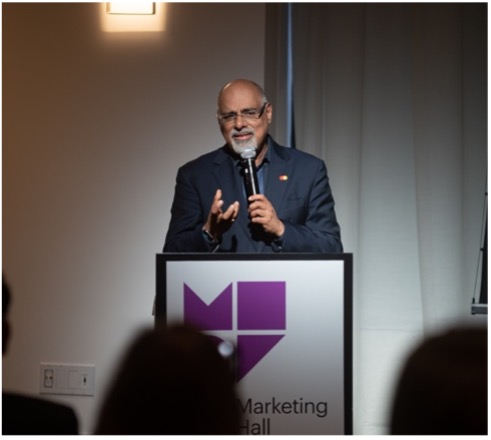 Raja is equally emphatic. His view is “every single thing we do today in marketing is already obsolete. We need to redo it in a completely different way.” The rate of change is mind-blowing. Part of this is the new technologies which are coming, AI, augmented reality, virtual reality, autonomous cars, blockchain. There are also tectonic changes happening in the cultural landscape. These have a direct impact on marketing which has to be plugged into culture and in a way that stands out in consumers’ minds. His book, Quantum Marketing, is about the fact that marketing is at an inflexion point. It’s time to move into a “fifth paradigm.”
Raja is equally emphatic. His view is “every single thing we do today in marketing is already obsolete. We need to redo it in a completely different way.” The rate of change is mind-blowing. Part of this is the new technologies which are coming, AI, augmented reality, virtual reality, autonomous cars, blockchain. There are also tectonic changes happening in the cultural landscape. These have a direct impact on marketing which has to be plugged into culture and in a way that stands out in consumers’ minds. His book, Quantum Marketing, is about the fact that marketing is at an inflexion point. It’s time to move into a “fifth paradigm.”